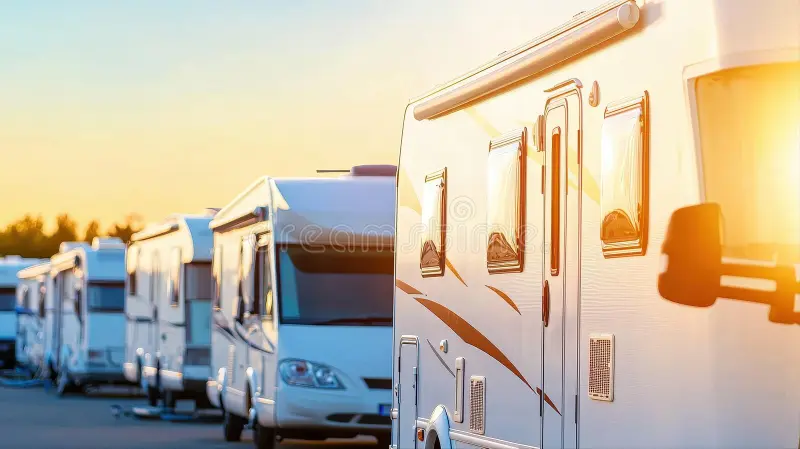
The recreational vehicle (RV) market is doing excellent business. More Americans drive on the road than they ever did before which has increased the marketability of secure RV parks. However, to construct or add on to an RV park requires money – a lot of it. That’s where RV park loans come in.
Should you want to lend or build an RV park in 2025, you should be aware of what the lenders want. In particular, in 2025, where the economic environment and lender expectations are changing rapidly.
So, this guide will break down what you need to get approved for RV park loans and how to position your project for fast, reliable funding.
Why RV Parks Are Attracting Investors in 2025
Before diving into loan requirements, let us have a brief overview of the current RV park market.
Following the RV Industry Association, the estimated shipments of the RVs are projected to reach a mark of around 350,000 by the year 2025. This is due to remote work and digital nomadism and post-pandemic travel behaviors, Americans have reformed their vacationing and life habits. The result of this means that RV parks are now becoming residential communities- not a weekend destination.
This transition transforms RV parks into cash flowing property. However, you have to have capital to exploit this opportunity. And you will need a lender who understands the ins and outs of this niche.
What Lenders Look for in RV Park Loans
Not all RV park loans are the same. However, the majority of lenders, in particular directly private lenders such as Loan Locker pay attention to essentials. So, let us take a look at them.
1. Location and Market Demand
Firstly, the first thing lenders assess is location. Is the RV park in a high-demand travel area? Near national parks, highways, or popular destinations?
In 2025, lenders want to see data. Show trends in local tourism, occupancy rates in nearby parks, or highway traffic volume.
Tip: Use market research to prove that your RV park is positioned to succeed. Strong location equals strong returns—and that equals less risk for the lender.
2. Experience of the Borrower
Secondly, have you operated an RV park before? Or do you have experience in hospitality, property management, or real estate?
Lenders are more willing to fund borrowers with a track record. However, if you’re new to the space, partnering with an experienced operator can help.
Even private lenders offering RV park loans want to know that their capital is in capable hands.
3. Site Plans and Use of Funds
Thirdly, you need to show exactly how you’ll use the funds.
Whether you’re acquiring land, building new hookups, renovating restrooms, or expanding amenities, a detailed breakdown is crucial. Include cost estimates, site maps, and construction timelines.
This level of detail builds trust—and shortens approval time.
4. Financial Projections and NOI
Furthermore, lenders want to know your projected Net Operating Income (NOI). How much will the RV park earn monthly or yearly, after expenses?
Include expected occupancy rates, nightly fees, operating costs, and management expenses.
Even if your numbers are estimates, they should be realistic and based on comparable properties.
Remember: a lender’s biggest concern is whether you can repay the loan. Strong projections make that clear.
5. Collateral and Exit Strategy
Lastly, RV park loans are often asset-backed. That means the property itself serves as collateral.
If you’re purchasing an existing park, lenders will also assess its current value, debt, and revenue.
An exit strategy—whether through refinancing, selling, or paying off with cash flow—is equally important. Private lenders want to know how and when they’ll be repaid.
Types of RV Park Loans in 2025
There are several financing options for RV parks, but each comes with different terms.
Traditional Bank Loans
To begin with, conventional lenders typically offer low interest rates but have strict requirements. You’ll need a strong credit score, detailed financials, and time for underwriting.
Cons: Can take months and are hard to qualify for if you’re a new investor.
SBA Loans
Next, the Small Business Administration offers 7(a) loans that are often used for RV parks. They come with favorable terms but require a lengthy approval process and lots of paperwork.
Private RV Park Loans
Additionally, private lenders, like Loan Locker, offer fast and flexible funding. These loans are ideal if you need to close quickly, don’t qualify for a bank loan, or have a unique project structure.
Private RV park loans may have slightly higher interest rates, but you gain speed, simplicity, and control.
Why Work with Loan Locker for RV park loans?
Loan Locker is a direct private lender based in Tampa, Florida. Unlike traditional banks, we have access to discretionary capital, which means we make lending decisions fast—often in days, not months.
Plus, we specialize in funding real estate projects like:
- RV parks
- Fix and flip loans
- Mobile home park loans
- Land development
- Multifamily properties
We understand the value of stable capital as we have our hands-on experience in real estate, property management and other constructions.
Being a first-time investor or an experienced operator, we can make a loan suitable to your requirement. No red tape. The actual expeditious financing.
Final Thoughts: Get the Right RV Park Loans for Your Goals
RV parks are no longer a niche investment—they’re a major opportunity in 2025. With more Americans choosing the RV lifestyle, it will cease being a niche investment opportunity, but an opportunity on scale in 2025. More Americans take the RV lifestyle, and the demand is high, with returns being excellent.
However, before getting the finance you require, you need to know what the lending institutions require.
If you’re ready to take the next step and secure financing for your RV park project, let us help. At Loan Locker, we make RV park loans simple, fast, and tailored to your vision.
Get started today at loanlocker.com.
